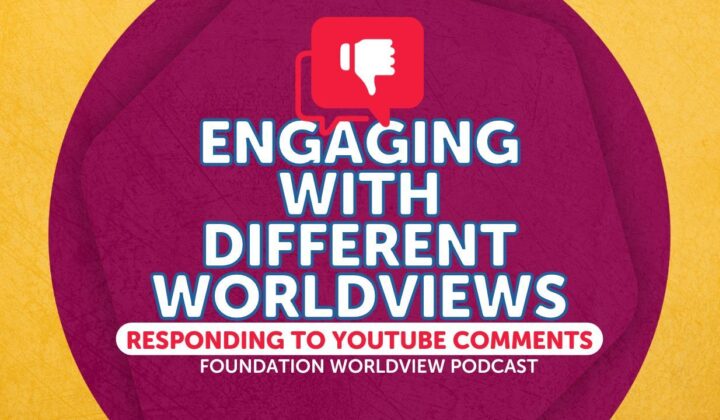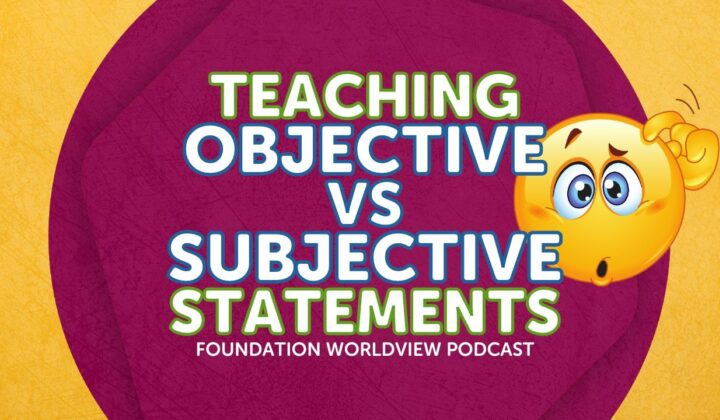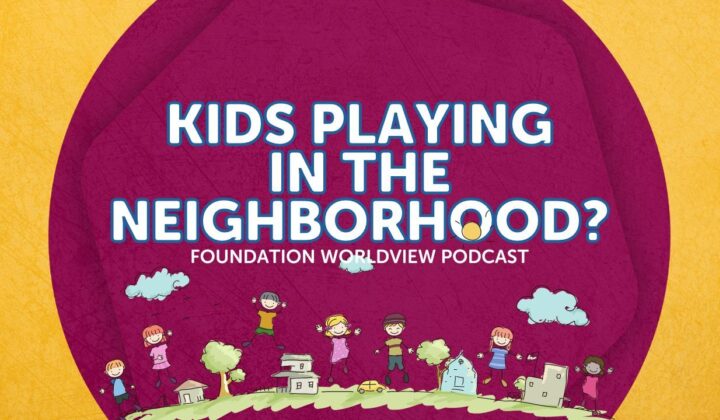Learn more about the journey that led to us equipping kids to carefully evaluate every idea they encounter.
Meet members of our team who have contributed to curriculum development.
Hear from real users of the Foundation Curriculum.
Learn what we believe about God, Jesus, Scripture, and more.
How to Set Boundaries in Parenting Without Resentment
Today's question says, "Am I being too strict by not allowing my children to play outside, unsupervised, with the neighborhood children? The rules are if daddy or mommy aren't out there, then you aren't out there. My 9-year-old is beginning to show signs of resentment toward how different we live from other families."
Transcript
Note: The following is an auto-transcript of the podcast recording.
Hello friends, and welcome to another episode of the Foundation Worldview Podcast where we seek to answer your questions so that you can equip the children that God has placed in your care to carefully evaluate every idea they encounter and understand the truth of the biblical worldview. I'm your host, Elizabeth Urbanowicz, and I'm thrilled that you've joined me for another episode today. Today's question says, "Am I being too strict by not allowing my children to play outside, unsupervised, with the neighborhood children? The rules are if daddy or mommy aren't out there, then you aren't out there. My 9-year-old is beginning to show signs of resentment toward how different we live from other families. Help." This is a good question because I think it's always important for us to think through is the differences or are the differences that we have in our family, are they biblically based, or are there some differences that we need to consider not having any longer? And so this is a good question for us to think through.
Now in this question, there are two different issues that are mentioned here. Now, the first issue is correct ground rules for playing outside, and then the second issue is a child resenting household rules. And so I think we need to look at both of these issues, and I'll address the second issue first, the issue of a child resenting household rules. And so I think a really important question for us to ask ourselves is first, are we listening to our child to figure out where this resentment is coming from? Because there could be a sinful resentment where our child is just rebelling against us for setting up healthy God honoring boundaries. Because even Scripture says, no, discipline seems pleasant at the time. So anytime there are certain boundaries or disciplines put up to make sure that we are raising children in a way that honors God, our children aren't naturally just going to appreciate those boundaries. So our child might be bucking against our authority simply because we have put in place God honoring boundaries. However, there can be other times where our boundaries are not appropriate and they're pulling against those boundaries because of that reason, because our boundaries are too strict or they're not actually aligned with what God has designed. And we need to discern the difference between these two. Is my child just bucking against God honoring boundaries that I've put in place or are the boundaries that I've put in place not really developmentally appropriate or not even biblically sound?
I actually just listened to a great podcast on this recently. If you're not familiar with the Family Vision Podcast, put out by Visionary Family Ministries. Highly recommend that you check it out. And I recently listened to a podcast where Dr. Rob Rienow, he and his wife Amy co-host the podcast, he was talking about how one of their sons, when he was around, I think like 10 years old, just started to pull away from him. And he noticed that his son was pulling away from him, and he was just like, what in the world is going on? And rather than just trying to change things, he actually asked his son a question and said, "Hey, you know what? I've noticed that you haven't been as open and honest with me recently as you have in the past. Have I done anything wrong?" And his son actually told him, yes, you have. And his son explained that Dr. Rienow, his dad was treating him more like his younger brother than his older brother. And through this conversation, Dr. Rienow realized like, oh yes, my son is a 10-year-old now. He's not seven anymore, and I'm treating him still like a 7-year-old, rather than treating him like a growing maturing kid.
So we want to make sure that we're actually asking our kids good questions to figure out where this resentment is coming from, because if it's a resentment, that's just their sin that's mad at us for setting up healthy boundaries. We can talk with them about it, but we shouldn't change what we've set up. Where if we find out we're treating them in a way that's not actually developmentally appropriate, then we're the ones that need to change. So again, that was the Family Vision podcast that I mentioned put out by Visionary Family Ministries.
Now, the second part of this question talks about appropriate rules for outside play. And the question that I think we need to ask ourselves is, again, like I almost always say, is what is the goal? What is the goal here? Why have we set these rules in place? Why is the rule that you can't be playing outside with the neighborhood kids unless mommy or daddy are there? And I think there's a few possible reasons. One, is there a danger of traffic? Do we live in a really busy area and where cars are coming up and down the street and we just think my child is not physically safe being out there with the amount of traffic that comes through our neighborhood? Another reason is maybe do we live in an unsafe neighborhood? Maybe we just live in a neighborhood where it's not safe for kids to be outside. Maybe we live in a more urban area and there's tons of people going by and we don't know who those people are. Or maybe there's actual shootings in our area, or maybe kids tend to get taken off the street more often in our community than in other communities. A third possible option is, are we fearful of our kids being alone with the neighborhood kids or we feel fearful that those neighborhood kids are going to be a bad influence, that our kids are going to learn things from them that they wouldn't have learned inside of our home.
So I think those are three probably of the top reasons. Danger of traffic, just we live in an unsafe neighborhood or just fear of our kids being alone with the neighborhood kids. Well, so then we need to ask ourselves, okay, is the rules that we have set up, are they necessary? Are these rules necessary? Well, if our main fear is traffic, I think a really simple solution is we can get a fence fencing in your neighborhood, keep your kids safe, and you can just require that if your kids are going to play outside with the neighborhood kids, they're going to play in your front yard, which is fenced in. And so the fence can be a solution to traffic. And then you can just have rules if the ball goes outside the fence, they actually have to come to get you to go and get the ball in the road. If you live in an unsafe neighborhood, supervised play might be the only option. I know that where I grew up, my parents were very intentional about the city in which we grew up. I don't think myself or any of our siblings would willingly choose to raise a family in that city just because of it is a more urban area and it is more dangerous. But our parents, that's what they chose for us, and they chose it because they felt very called to be a light for the gospel in that community. And so now we didn't live, we lived in a nicer area of town. We didn't live in the real downtown area, but it still wasn't super safe when we were young for us to be playing outside in the yard on our own because there was lots of people going by our house. Just lots of people in our city struggled with alcoholism and drug addiction and just came from really broken homes with a lot of violence. So it wasn't a safe neighborhood for us to be outside by ourselves. And so I think probably probably around the age of 10 or 11, my parents were okay with us being outside without them there, and they didn't have a fence. But when we were little, it wasn't just a neighborhood where you could just go outside by yourself and be okay outside. And so if that's the case that you're in and you've chosen to live in that city, whether you don't have an option or you've purposely chosen to live there, supervised outside play might be the only option.
If you're fearful of the neighbor kids and what your kids are going to be exposed to by playing with the neighbor kids. I don't think that in and of itself is a good reason to say that there can be no unsupervised play because I think that there can be certain boundaries that are set up that allow our children to be outside with the neighbors. Because the fact of the matter is we live in the world and we have to train our kids to be in the world, but not of the world. And we can't always be there facilitating every single interaction and conversation with our kids. We have to allow our kids to be exposed to the world, and we also have to let them learn how to love their neighbor as they love themselves. And so we can just set up certain boundaries. Maybe they're only allowed to play in our yard. Maybe we want to make sure that we're in earshot of what's happening. So we say, you can't go down the street to play in the cul-de-sac, or you can't go down the street to play in so-and-so's yard. But if you want to invite the neighbor kids into our front yard to play, then you can do that and you can play. You could say that you're not allowed to go in the backyard or you're not allowed to go in somebody else's house. Maybe you allow them to play in the front yard of the people across the street or the people next door, but you say, you know what? You're not going to go in the backyard and you're not going to go in their house. I don't want you to go in their house alone.
At some point, we do need to give our kids more freedom. We do need to allow them to make certain decisions. We do need to allow them to really put into practice the things that we have been teaching them at home. And I think neighborhood play, especially if it's just out in our front yard and we're still with an earshot, even if we're not there, that can be a really good opportunity for us to give our kids more freedom. And I think really around the age of eight, that's a really wise age to start giving our children more freedom in this area.
Now, there are certain conversations that we need to make sure that we have with our kids. We need to make sure that they have an escape plan. If somebody in the neighborhood suggests that they do something that is wrong, what are you going to do? If they suggest that you play a game, I'm just pulling something out of thin air, but a game that's very violent or a game where you're going to be using bad words, what are you going to do there? Or also an escape plan. Not that I think this is going to be happening in people's front yards. I think this is very unlikely. This would more likely happen inside the house, but we have to give our kids an escape plan for what happens if somebody shows you a bad picture or a bad video? What happens if somebody shows you pornographic material? What are you going to do immediately? And so just making sure that our kids understand what they're going to do in these situations because at some point in their life, they are going to face these situations, whether it's they're in our front yard or whether it's when they're an adult or when they're a teenager. We want to make sure that we're preparing them for these different situations.
So those are the things that I would really recommend first, just figuring out why is your child pushing back against the boundaries that you've set up? And then what are some appropriate rules for outside play? So I think I've given just some ground rules, but I don't know the exact situation in which you and your family find yourself. So what I would encourage you to do as I encourage on many podcasts and webinars is talk with those that you trust within your local body of Christ. They know you, or they should know you and should know your children pretty well. So they should be able to give you more specific advice that I can't offer as someone who's very, very far removed from the situation. So just highly encourage you to check out just who else in your local body of Christ is walking through these things. Who can you ask for sound counsel?
Well, that's a wrap for this episode. But if you have a question that you would like for me to answer on a future Foundation Worldview podcast, you can go to FoundationWorldview.com/podcast to submit your question. As we leave our time together, my prayer for you as always is that no matter the situation in which you and the children God has placed in your care, find yourselves that you would trust that God is working all things together for your good by using all things to conform you more into the image of His Son. I'll see you next time.
Related Posts and insights

Engaging with Different Worldviews
In this episode, Elizabeth Urbanowicz responds to comments from a previous episode on talking to children about dinosaurs. She addresses the pushback received from those with different worldviews. Elizabeth then models how to ask good questions when encountering false claims that go against Christianity.

Teching Objective vs. Subjective Statements to Kids
In this episode, we tackle the question: How do we tell the difference between objective and subjective statements? Join us as we dive deep into this topic and discover practical ways to teach kids this important skill.

Kids Playing in the Neighborhood?
In this episode, we tackle the question of how to navigate relationships with neighborhood children while maintaining a biblical worldview. We discuss the importance of discipleship, setting boundaries, and preparing our children to be a faithful gospel witness in their community. Tune in for practical insights and overarching principles to guide you in this important aspect of parenting.





